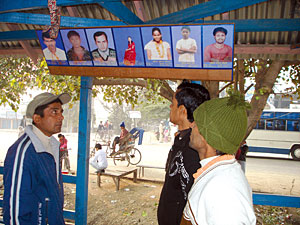 JOHN NARAYAN PARAJULI |
A parliamentary probe confirmed the involvement of Prahlad Thapa Magar and two others, Bir Bahadur Mahara and Nirmal Kumar Panta, recommending immediate arrests and a criminal investigation. Five years on, the incident has vanished from the public memory. "Even after repeated request, the government has refused to give us a copy of the report," says Mandira Sharma of Advocacy Forum who has been following the case.
At least 16,000 people were killed in the war. There is no official study to show how may died in direct combat on both sides and how many were actually raped, tortured and murdered. But even some emblematic cases like that of Maina Sunuwar and Muktinath Adhikari are enough to expose the fault-lines in our judicial system.
When Maoist politburo member Agni Sapkota, accused in the murder of Arjun Lama of Kavre in May 2005, was appointed Minister for Information and Communication in the Jhalnath Khanal government, there was widespread condemnation by human rights bodies nationally and internationally. A delegation of Nepal's human rights activists even filed a PIL in the Supreme Court but they could not prevent Sapkota from taking the office.
These are just two cases of justice being denied, not because of lack of evidence or laws, but because supremacy of law has been challenged by political and military institutions that refuse to submit to its jurisdiction.
Last month, the Maoists and the Madhesi alliance signed 4-point deal which, among other things, talks about extending blanket amnesty in excesses perpetrated during the conflict period. After taking office, Baburam Bhattarai clarified that the cases will first be investigated to ascertain the seriousness of the crime. It is within government's power to grant amnesty, but given the history of atrocities, it is ethically wrong and violates the victims' right to justice.
Similarly, the failure of the government to ensure civil court trials against army and police involved in extra-judicial killings and shameful silence on the matter across the political spectrum and civil society is an indication that security institutions have not submitted to civilian control. Investigation into civilian casualties is jurisdiction of the state and the Nepal Army's refusal to cooperate in prosecuting personnel involved in such cases in a civil court makes it a violator of the law of the land (Army Act 2006, Art. 63, 66).
Yubaraj Sangraula, who defended Agni Sapkota as Attorney General told me this week: "The court cannot prosecute a person on the basis of an FIR and a report which does not have a legal standing." Experts like Sangraula believe the problem lies in Nepal's criminal justice system which lacks the institutional framework to bring the crimes committed in special circumstances like war, where no FIR are filed or statements have not been submitted, within the legal jurisdiction.
Global experience shows perpetrators often assume posts of power and use their positions to escape prosecution. Nepal's post-conflict managers must learn from it and come up with legal provision for an independent body that can probe into such cases and ensure effective remedies where grave injustice has been done. The need for an independent Truth and Reconciliation body stems out of this logic.
In the last few weeks, the Baburam Bhattarai government sent a positive message about its commitment to democracy and rule of law. But if it is sincere about what it says, it must help in the investigation of wrongdoings involving its members. Similarly, Nepal Army's empty commitments to civilian supremacy will not clean its tainted human rights record.
The administration of justice is the foremost duty of the government, and Bhattarai has the job of bringing all sides to the table to complete the peace process, while making them accountable for their deeds.
The pursuit for justice has been a mirage. It can't wait any longer.
Read also:
Reality check



